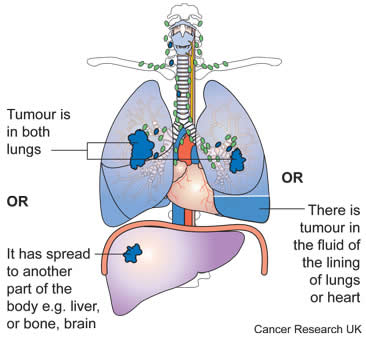How to Tell If Lung Cancer Has Spread to Brain?
What the worst scenario of lung cancer is when it has spread (metastasis). For such case, the disease is less likely to respond to any treatment and therefore it becomes more difficult to treat. The metastasis of this cancer can spread anywhere, but it is likely to spread to particular places in the body (such as brain). How to tell if it has spread to brain?
This is the most advanced stage of lung cancer. It is also the time of when the disease has the worst prognosis and outlook.
Over time, the cancerous tumor in lung grows and become bigger. Eventually, the cancer cells break away from the primary tumor and travel through bloodstream or/and lymphatic system – and they can travel throughout the body.
In other parts of the body, they can grow and make a new cancerous tumor called secondary cancer. The metastasis of lung cancer is likely to cause secondary cancer in the lymph nodes, liver, adrenal glands, bones, and brain.
For summary, the stage IV means you have one or some of the following conditions:
- The cancer has grown in the both lungs.
- It has spread to distant organs such as brain.
- It has caused fluid containing cancer cells around the lung or heart.
See this picture below (image credit to Cancer Research UK)!
The metastatic cancer can be found at the first diagnosis of the disease. In a few cases, some patients may also have the advanced stage even though they have followed the cancer treatment.
Lung cancer itself is quite common to be diagnosed at advanced stages! This may be one of the answers of why the mortality rate from the disease is higher than other cancers.
The type of lung cancer can also determine the prognosis. While some can grow and spread aggressively, others grow quite slowly. For more information about these types, see more in this previous post!
At the metastasis stage, both small cell and non-small cell lung cancer can affect the brain. But in general, it seems that small cell type is likely to spread to the brain than non-small cell type.
 The symptoms of brain metastasis can vary. Typically, it will cause some of the following symptoms:
The symptoms of brain metastasis can vary. Typically, it will cause some of the following symptoms:
- Change in the strength (weakness) of a leg or arm.
- Headache, this can be severe and may also be followed with sickness.
- Confusion.
- Drowsiness.
Other symptoms may include general feeling of sick, vision changes, changes of mood, changes of personality, or even seizures. Since the primary cancer that spreads cancer cells to the brain is located in the lung, these symptoms may occur together with the common symptoms of lung cancer!
Observing the symptoms of secondary brain cancer that you have is usually not enough to make the diagnosis of the metastasis of lung cancer. Some tests are required to help make the diagnosis more clearly.
To tell if a lung cancer has spread to brain, there are some tests and procedures you need to follow. But in many cases, this brain metastasis is often caught on brain scan (imaging test) such as with CT-scan or MRI scan.
If your doctor believes that you have a secondary brain cancer from your lung cancer, there are a series of investigations you need to follow. The following are the checklists of common procedures you may need to take:




